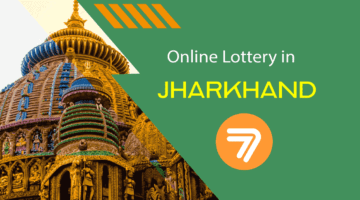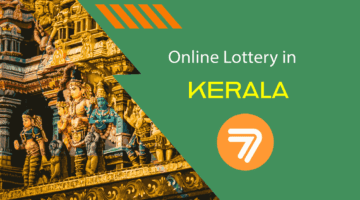BEST INDIAN LOTTERY SITES
₹1,00,000 Deposit Bonus!
- Paytm & PhonePe payments
- Live Lightning Roulette & Aviator!
- Fastest Indian Rupees Withdrawals!
BRAND NEW Indian Lottery with Cheap Lottery Tickets!
- Fast Withdrawals
- Top-Rated Lottery Games
- Cheap Lottery Tickets
PAYTM Lottery with Fast Withdrawals!
- India Exclusive Lottery Site
- Credit & Debit Card Payments
- Huge Jackpots
PAYTM Lottery with Fast Withdrawals!
- Paytm Deposits and Withdrawals
- Cheap Lottery Tickets
- Great Trust Score
ONLY ON SEVENJACKPOTS: ₹1,00,000 Welcome Bonus!
- Over 4000 game titles
- Paytm & UPI
- ₹250 minimum deposit!
₹1 Lakh over your first 3 deposits!
- Fastest Indian Rupees Withdrawals!
- 4000+ casino & live casino games
- UPI, Paytm, gPay & PhonePe withdrawals
₹1,8 CRORE Welcome bonus!
- Paytm & Crypto payments
- Casino, Live, and Sports
- Supports Indian Rupees
Best Online Lottery in India Reviewed
There is more online lottery in India than ever, and you can legally buy lottery tickets from anywhere in the country. With so many options available, it can feel overwhelming, and it can be hard to know which sites are actually good.
To help you choose which is the best fit for you, we have created a top list of the best online lotteries in India. Our list is based on our own experiences buying tickets at each site and ranking them on several criteria. The sites in our list are not only our favorites but the most popular online lotteries in India right now.
We have purchased more than 1000 tickets online, so we can confidently say that we truly know which are the best.
Our ranking system is extensive, but we can summarize it by saying the most important factors to be considered a top-ranked online lottery, a site needs to have fair-priced tickets, easy and quick money withdrawals, an international reputable gambling license, and a wide variety of games.
We prioritize security above all else. We can guarantee that every single website listed on this page will treat you fairly.
If you are new to online lottery, don’t worry, this guide is made for beginners and experts alike.
-
LOTTOSMILE – Top Lottery Online for Indian Players
Want to experience true online lottery craftsmanship? Then LottoSmile is for you!
TheLotter is one of the world’s most trusted lotto sites, and LottoSmile is their India-exclusive site. LottoSmile was created in 2019 with Indian players in mind and quickly grew in popularity in all Indian states. With a dedicated site for Indian players, they offer a tailored service that many other online platforms can’t.
At LottoSmile, you can play Powerball, EuroMillions, Mega Millions, and many more of the world’s highest-reward lotteries. The wide variety of top-rated lotto games with reasonable ticket prices is another reason why LottoSmile is ranked at the top.
You can easily pay with your debit or credit card and make withdrawals with net banking.
LottoSmile is also famous for its great promotions that are constantly updated.
-
THELOTTER – The best online lottery in India
TheLotter is one of the best online lotteries in India and has made several crorepatis which is the main reason we think this site is great! The site was founded already in 2002, and with more than 20 years of experience in online lotteries, they excel in many areas.
TheLotter is not a site created exclusively for India, that would be their sister site, LottoSmile, which you can read more about here in our guide.
If you are looking to play international lotteries in India, TheLotter is for you. Its specialty is international draws with huge jackpots; you can buy tickets for these at some of the best prices on the market. They have tickets from every corner of the world, unlike many other competitors that only focus on major games like Powerball and EuroJackpot.
Maybe you’ll be their next big winner, joining Lingaraju D from Bengaluru, who took home prize money of ₹3.8 crores!
-
LOTTOFY – Best Indian Lottery site for Cheap Tickets!
Lottofy entered the Indian online lottery market in 2020, becoming one of the youngest lottery sites in the country. But old is not always better, as Lottofy shows up with an arsenal of cheap lottery tickets, unique promotions, plenty of trustworthiness, and a legitimate MGA gambling license from Malta!
At Lottofy, you’ve got all the biggest international lottery draws at the tip of your fingers. From Powerball and Mega Millions from the US to Europe’s very own EuroMillions, Spain’s La Primitiva, and the worldwide Superlotto Syndicate that covers the week’s draws for just €10!
Purchasing your online lottery tickets is made simple by offering several well-known payment options like Visa, Mastercard, Skrill, and Neteller. And that’s not all; you can easily gain direct access to your tickets and all the latest draws by downloading the Lottofy Android or iOS app.
TOP 3 INDIAN LOTTERY SITES
Are you a true lottery fanatic and have tried all of the websites above?
Here is the full list of the best lottery online in India.
- LottoSmile – Top Indian Lottery Site in Delhi
- Multilotto – Exceptional Online Lottery App
- TheLotter – Best Classic Lottery Site
HOW TO PLAY ONLINE LOTTERY
Online lottery is made easy with all the great websites available right now.
You can easily access the best lotto games in the world from India; all you need is a digital payment method and a mobile.
A ticket purchase can be made in a matter of seconds, and you can find plenty of genuine sites where to get hold of tickets here at SevenJackpots.
We have reviewed each of them thoroughly, and the way to participate works the same on all sites.
All you need to do is:
- Pick an online lottery site from our list.
- Sign up and make a deposit.
- Select which draw you wish to join.
- Choose your lucky numbers, place your ticket, and wait for the draw!
BUY ONLINE LOTTERY TICKETS IN INDIA
Imagine you buy a lottery ticket, and your numbers end up winning a jackpot several crores large!
Online tickets give you the chance to win huge jackpots, and they also offer you another level of safety.
When you buy a ticket from one of our recommended sites, you are guaranteed top international security standards, keeping your tickets secure.
You’re able to log in to your account from any device to review your tickets, collect winnings, and buy tickets.
Making a ticket purchase online is also just so much easier. Once you have signed up to one of our recommended lottery sites and your payment method has been accepted, you can buy a ticket online in a matter of seconds.
Just 5 minutes remaining until the draw?
Not a problem with lottery tickets online! Just choose your favorite numbers, tap the pay button, and you are good to go.
HOW TO PURCHASE A LOTTERY TICKET
- Select one of our best Indian lottery sites.
- Head to the draw you wish to buy a lottery ticket for.
- Either pick your own favorite numbers or get randomly selected ones.
- Pay for the ticket.
- Wait for the draw!
ADVANTAGES OF ONLINE LOTTERY TICKETS
- You’ll never lose your tickets.
- Tickets are stored on your lottery site account.
- Able to review all old lottery tickets.
- Get your gameplay history to help in choosing your next set of lucky numbers.
PURCHASE LOTTERY TICKETS HERE
Best Tickets to Buy Online
You can buy tickets for a huge number of lotto games in India, but some, of course, are better than others. We have ranked the tickets based on a wide variety of factors and created a list of the best online lottery tickets available in India.
Even though our ranking process is extensive, the three main factors we take into account are:
- Ticket Price
- Jackpot Size
- Prize Tiers
Below you can find our complete list of the best lottery tickets in India.

1. Powerball – Best Online Lottery Ticket in India
- Worlds biggest jackpot
- Available to purchase at all online lottery sites in India
- 3 Draws a week
- Higher priced tickets
- Only a few jackpot winners per year
Powerball is the world’s most popular lottery ticket to buy, and it is also the most popular in India. With the world record for the biggest jackpot, it is easy to understand why.
The availability of Powerball tickets is another reason why they are considered the best online tickets to buy. They are also the tickets that are most frequently on promotion. Most sites include free tickets in their welcome bonuses.
Online tickets for Powerball can be purchased at all our recommended online lottery sites. Buy a Powerball ticket in India for 300 rupees.

2. Mega Millions – Top-Rated Online Lottery Ticket
- Second biggest lottery jackpot in the world
- Multiply lottery ticket prizes with Megaplier
- Lots of promotions on tickets
- Only two draws a week
- Low chances of winning the jackpot
When you buy a lottery ticket from Mega Millions, you have the chance to win one of the world’s largest jackpot prizes. It has rewarded the second-biggest jackpot ever of more than 1.5 billion US dollars.
Just like Powerball tickets, you can find tickets for Mega Millions at all our recommended lottery sites. The accessibility makes it one of the best tickets to buy. Another reason why they are considered great tickets to purchase is that many sites offer them in lottery syndicates, so you can increase your chances of winning.
You can buy tickets for Mega Millions for 300 rupees at all our recommended lottery sites.
Online Lottery Casino Games
Lotteries are not only bound to physical draws at set times during the day or week. There are also plenty of casino lottery games that you can enjoy!
A lottery casino game is played like any online live casino game, where you place bets, and wins are paid out in a matter of seconds or minutes before a new round starts.
With casino lotto, there are plenty of variations as well, from betting on the exact order of numbers to purchasing tickets with randomly selected numbers.
Lightning Lotto
Lightning Lotto from Evolution has to purchase tickets of six numbers, five regular and one power number. Regular numbers range from 1 to 25, and power numbers from 1 to 10.
Each round sees up to two numbers get struck by lightning to be dealt a multiplier between 2x and 10x.
Tickets with lightning numbers multiply their winnings as long as three or more matches are made. Make six matches with a 20x multiplier to win a staggering 1,00,000x your bet!
Keno
Keno by TVBET has you select numbers you’ll want to match during the draw. In this Keno lotto game, 20 balls are drawn out of 80.
Bet on exact numbers, the sum of numbers, the exact order of the numbers drawn, odd, even, higher, or lower. There’s plenty of fun betting options to explore here!
As the number of balls is higher than at the other two casino lottery games presented here, payouts also reach higher, with a max payout of one million times your bet!
Bet on Numbers
The sky is the limit in Bet on Numbers from Ezugi, where you can place numerous thrilling bets! Bet on numbers, colors, and sums, and reap the rewards of the additional multipliers in play.
Predict a number for a 7x multiplier or two numbers back-to-back for a 70x payout. Three correct balls reward you with 750x, while four correct one pays a mouth-watering 2000x.
Color bets are great ways to maximize your winning probabilities, with odds as low as 1.7 and as high as 60.
HOW WE RATE AND REVIEW ONLINE LOTTERY SITES
Rating and reviewing lottery sites is much more than just trying them out and deciding if they are good or bad.
Here at SevenJackpots, we take reviewing gambling sites seriously; just take a look at our lottery reviews and see for yourself.
We analyze every factor of an online lotto site, from the draws they offer to the time it takes for customer support to respond.
These in-depth site reviews are done not only to guarantee your safety as a customer but also to make sure that you get the best possible service. All our reviews are based on the same criteria, guaranteeing a fair judgement.
We review all sites based on the same criteria, and these are some of the aspects we look at when making our lottery reviews:
- Payment Methods
Secure payment options that are easy to use & provide fast transactions. It is also important that the site has several payment methods to choose from so you can select the one you prefer. Indian payment methods like Paytm and UPI are needed to get a top score. - Safety
Encrypted websites that keep you and your details safe. Both your financial data and personal data need to be protected. It is also important that the website has a clear company policy regarding who gets access to the information you add to the website. - Good Licenses
Using trustworthy gambling licenses from well-known regulators. European gambling licenses are preferred since they have tougher requirements. Online lotteries with several gambling licenses from different jurisdictions get a higher ranking. - Selection of Lotteries
Great selection of the most popular draws in the world. The site needs to offer all the largest draws, like Powerball and Mega Millions. International sites with exclusive branded Indian online games get a higher ranking. - Withdrawals
A wide selection of ways to withdraw is important. We have ranked our reviewed lotteries based on withdrawal speed, variety of withdrawal methods, and if there are any fees. Fast withdrawals and no fees receive a higher score. - Promotions
Lottery sites with continuous promotions that are updated frequently. The more promotions the better. We also like to see a wide variety of promotions like cheaper tickets, free tickets, and boosted prize payouts.
LOTTERY JACKPOT GAMES ONLINE
Heading online to chase large lottery jackpot winnings is a great idea.
While your local, government-run lotto can make you a lakhpati at most, online jackpot draws are able to make you a crorepati several times over!
That’s right, due to the immense popularity of major draws, buying tickets or joining syndicates for international major draws is much more likely to land you prize money able to get you a new dream home or other astronomical prizes!
The big difference between government games and online jackpots is the way they work. Indian games almost always have a guaranteed winner, like Keno. On the other hand, online lottery jackpot games most often have a jackpot that rolls over. This means that if there is no winner, the prize becomes bigger for the next draw, which creates huge jackpots!
It is very exciting to play online, dreaming away about a jackpot. That is why it is also very important to be aware of how much you are playing and be conscious about your purchases. Take a look at our page about why responsible gambling is important so you can enjoy the draws in a safe way.

POWERBALL
Considered the biggest of all lottery tickets, Powerball is a force to be reckoned with. It’s an American lottery product available to players in all corners of the world.
To play Powerball, you’ll choose five numbers between 1 and 69 and then one unique Powerball number between 1 and 26.
What’s the potential of this draw, you might ask? Well, the world record payout reached over ₹16,400 crores!

MEGA MILLIONS
Being able to pay out huge sums, Mega Millions is sure to bring MEGA excitement to all participating in the major draws!
Here, you’ll choose five numbers between 1 and 70, as well as one Mega Millions Golden Ball number between 1 and 25.

EUROMILLIONS
As the name suggests, this draw is located in Europe, but thanks to great websites offering the game, it’s available to anyone in India!
Although the EuroMillions jackpot cap is smaller than its American counterparts, capped at “just” €250,000,000, it is known for its long list of winners!
Choose five numbers between 1 and 50, plus two Lucky Star numbers between 1 and 12, to participate in the EuroMillions major draw!

EUROJACKPOT
EuroJackpot is possibly the smallest of the large international major draws.
Its jackpot is capped at €90 million, and you’ll join the EuroJackpot draw by selecting five numbers between 1 and 50 and two bonus numbers between 1 and 12.
Unique for the EuroJackpot is that any additional money added once the €90 million cap is reached is instead added to the second, third, and even fourth pots of prize money!
BRAND NEW Indian Lottery with Cheap Lottery Tickets!
- Fast Withdrawals
- Top-Rated Lottery Games
- Cheap Lottery Tickets
PAYTM Lottery with Fast Withdrawals!
- India Exclusive Lottery Site
- Credit & Debit Card Payments
- Huge Jackpots
₹1,8 CRORE Welcome bonus!
- Paytm & Crypto payments
- Casino, Live, and Sports
- Supports Indian Rupees
PAYTM Lottery with Fast Withdrawals!
- Paytm Deposits and Withdrawals
- Cheap Lottery Tickets
- Great Trust Score
ONLINE LOTTERY TICKET PRICES IN INDIA
When you choose a lotto game to play, one of the most important factors is the price of the ticket.
That, combined with the size of the jackpot, gives you a good idea of which ticket is for you.
To give you an idea of what a lottery ticket should cost, we have created a table with the average ticket price for the major games.
You can also see which days you can play and how big the largest jackpot is.
The biggest Indian jackpots are usually ₹10 crore. International jackpots, on the other hand, reach hundreds of crores easily; some top jackpot prizes even reach over a thousand crore rupees!
Lotto tickets online are also cheaper than bumper draws and have bigger jackpot rewards.
| Online Lottery | Ticket Price | Draw Days | Biggest Jackpot |
|---|---|---|---|
| Powerball | ₹300 | Tue, Thu, Sun | approx. ₹16,400 crores |
| Mega Millions | ₹300 | Wed, Sat | approx. ₹10,900 crores |
| EuroMillions | ₹240-300 | Wed, Sat | approx. ₹1500 crores |
| EuroJackpot | ₹350 | Friday | approx. ₹736 crores |
| SuperEnaLotto | ₹160 | Wed, Fri, Sun | approx. ₹1674 crores |
Online Lottery Ticket Booking in India
Making a lottery ticket booking online may seem complicated the first time you do it, but it really is simple.
Once you have chosen a site to play at from our online top list of trusted lotto sites, you are ready to purchase your first ticket!
Every site has clear step-by-step directions on how to make a purchase, but there are a few additional things that you should consider when making your first online lottery ticket booking from India.
Lottery Ticket Price
The first thing you need to do when making an online booking is, of course, choose which draw to participate in.
A great way to decide which draw you want is to look at the ticket price.
Many other review websites might recommend you to only choose mega jackpot games, but we believe it is more important to find a game you can play frequently.
So based on your budget, take a look at which game suits you. Most tickets cost between 80 and 400 rupees.
Lottery Numbers
Once you have decided on which game you want to play, the next step is to choose your numbers.
There are several methods how to choose your numbers, but the most common one is choosing numbers at random. As a matter of fact, most big jackpot winners chose their numbers at random!
That said, you can also select numbers that mean something personal to you, for example, a birth date.
There is no right or wrong way to choose; the most important part is that you feel lucky with the selection you have made.
Extra Features
Several lottery games offer bonus features, but these features often come with an extra cost. On top of this, many gambling websites have unique bonus features of their own as well!
This means that when you make your ticket booking online, you should also consider which bonus features you want to add if any.
The extra features can be anything from increasing the value of the real money prizes you win to entering an extra draw giving you more opportunities to win a prize.
IS LOTTERY ONLINE LEGAL IN INDIA?
Lotteries in India are regulated by The Lottery Regulations Act, 1998. So far, thirteen Indian states have used this act to set up local lottery services of their own.
That said, although some states offer legal lotto products, these are almost entirely offered through local shops. Legal online tickets to local draws are pretty much non-existent!
Playing online at international sites is, therefore, the way to go if you want to play legally, and with only a few exceptions; states don’t explicitly state that online lotteries are illegal!
What you need to know is that NO ONE has been punished for playing lotto online in India, but there have been countless winners!
Online Lottery States’ Legality
As you probably know by now, there are different gambling laws in each state in India. This also goes for state lottery laws. For example, there are only 13 states in India where lotto is completely legal.
We have summarized the legal landscape and created online guides for each of the states in India.
In these guides, you can find:
- Summary of the current lottery laws
- Recommendations for the best legal online draws in the state
- Step-by-step guides on how to purchase tickets
Below you can find some of the most popular legal guides.
Genuine Online Lotteries
Something that we take extremely seriously here at SevenJackpots is safety. When making our online lottery reviews, we dissect each part of the site, putting a lot of focus into making sure that the site is genuine.
What do we mean by genuine?
Well, to put it simply, it’s the guarantee that you will be treated fairly and that your data will be protected.
So when you look at one of the reviews here at SevenJackpots, you can be sure that the site is safe, and the only thing you have to look out for is a winning ticket with your name on it!
How to Spot Fake Lottery Sites
Sadly, with the popularity of online lotteries increasing in India, several fake sites have also emerged.
Luckily, scam lottery sites are easy to spot. You should look for three things specifically – if the site has international games, if they have licenses, and if there are any documented winners.
In India, it is only legal to play on international sites, so if the site only has local Indian games, it’s illegal. A gambling license guarantees you fair treatment and that the site is based outside of India. Finally, if there are no documented winners, it is probably a scam.
Here are some examples of fake lottery sites in India:
- Bhagyalakshmi Lottery
- Play India Lottery
- Asian Lottery .in
Responsible Gambling
Lottery and games of chance are lots of fun, but they can become too much in some cases.
Responsible gambling is the concept of playing games with wagers but doing so with clear intentions and within your limits.
Several websites allow you to stay in control of your ticket purchases by setting deposit limits and allowing you to put yourself on time out.
There are also many recommendations on how to gamble responsibly; for example, you should never ever gamble with borrowed money. If you want to learn more about gambling responsibly, check out our in-depth responsible gambling guide.
Genuine Indian Lottery Sites
| Rank | Site | Bonus | |
|---|---|---|---|
| 1 |  Lottofy Lottofy | BRAND NEW Indian Lottery with Cheap Lottery Tickets! | Play |
| 2 |  LottoSmile LottoSmile | PAYTM Lottery with Fast Withdrawals! | Play |
| 3 |  BC Game BC Game | ₹1,8 CRORE Welcome bonus! | Play |
| 4 |  theLotter theLotter | PAYTM Lottery with Fast Withdrawals! | Play |
INDIAN LOTTERY APPS
Indian online lottery apps are exclusive to mobile devices.
Apps like these can be downloaded from some of your favorite online lotto sites in India and come with cool features like notifications and tailored bonuses.
They are also optimized to work on pretty much any mobile brand and operating system like iOS and Android.
Once you have found your favorite website from our top list, you should download their app if they have one.
Everything becomes simpler with an app. You can make ticket purchases faster, easy withdrawal requests, tailor your notifications, and get exclusive offers.

INTERNATIONAL LOTTERY IN INDIA
All of the recommended lotteries here at SevenJackpots are international. They are all based outside of India and have good payout records. Since they are international and based outside of India, they are completely legal to play at from any state of India.
International lotteries like Powerball, EuroMillions, and EuroJackpot, are all games that are always 100% fair.
Since these lotteries are so massive, the level of security revolving around them is huge. This means that, should you reel in one of their astronomical jackpots, you’re guaranteed to receive the prize money.
Our international review of each draw tells you where you can purchase tickets for the game, any bonus features, and when the draws are. You can also find a ticket price comparison for each game.
International Lottery Winners from India
Not only has India started playing international lotteries online like never before, but there have also been some huge winners!
Mega Millions and Powerball are just two examples of international lotteries won by Indians.
Sandeep Singh won a Mega Millions jackpot worth $30.5 million just days after his girlfriend broke up with him.
Nandlall Mangal is another Indian lottery winner that outdid Mr. Singh. He won $246.5 million from Powerball in 2018!
INCREASE YOUR CHANCES OF WINNING A JACKPOT
When it comes to winning lotteries, the recipe is simple. It is all about reducing your lottery ticket costs while at the same time acquiring as many tickets as you can.
All jackpot winners have one thing in common. Before they won, they had all played for a long time and bought countless tickets.
There are two main ways to get more tickets at discounted prices, bonuses, and syndicates.
LOTTERY BONUSES & PROMOTIONS
Lotteries on the internet offer bonuses for all new players giving them a chance to try out games at a more favorable price.
These are called welcome bonuses and most often involve you getting free lottery tickets or being able to make your first purchase at a discounted price.
A great thing about these websites is the fact that you can sign up for several and, in that way, use several welcome bonuses.
Unlike state lotteries, online lotto sites often have promotions as well all throughout the year.
Make sure to keep your eyes open for offers such as 2 lotto tickets for the price of 1.
LOTTERY SYNDICATES
If you’re looking to increase your chances of winning a jackpot, the number 1 way to do so is by joining a syndicate.
Traditionally a syndicate is a group of people who pool their money together and buy as many tickets as possible, and then share all the prizes won on the tickets.
Online lottery sites have improved this notion by removing the most time-consuming part, finding people to join your syndicate, and offering players to join their finished syndicates.
The syndicates’ lotto sites usually have more than 100 tickets in each and are divided into shares.
You can buy as many shares as you like, and the more shares you have the larger portion of the prizes you get.
Types of Lottery Sites in India
The majority of lotto websites in India work as either lottery agents or lottery betting sites.
The result for you as a customer is more or less the same, but the way they work is different.
Below, we’ll go through how each of these methods works and the pros and cons of each.
Lottery Agent
The very first websites all worked as lottery agents, and the way an agent works is simple.
When you buy a ticket at a lottery agent online, the company actually goes out and buys you an official entry. This means that if you buy a Powerball ticket online, a company representative in the US walks to the nearest point of sale and purchases a physical ticket according to your order.
Out of all agents in India, LottoSmile is the most famous.
Pros
- All the tickets you purchase are official entries to the game you choose
- The payout comes from the official game
Cons
- Claiming a jackpot win is a lengthy process
- You need to buy your ticket well ahead of the draw since an agent has to go out and buy the ticket for you.
Lottery Betting
Lottery betting is just what it sounds like; you bet on the outcome of a draw. Bets on lottery almost always have the same payouts as the original draw that you are betting on, so in a sense, it’s just like buying an official ticket.
Any wins are paid out by the lotto betting site rather than the official organizer of the draw. Each betting operator has an insurance policy to cover any jackpot wins, so you are always guaranteed your payout!
Lottofy is the most famous lottery betting site in India.
Pros
- You can place bets (purchase a ticket) right up until the official draw
- All payouts are handled by the betting site, which means fast withdrawals
Cons
- You don’t buy official tickets, so all earnings go to the betting site instead of a public service program official lotteries might support
- There is no guarantee that the betting site covers any mishaps the official draw may have
Best Payment Methods For Buying Tickets Online
To buy a lottery ticket online, you need an online payment method.
There are plenty of different payment methods to choose from. The available payment methods can differ at each site.
Below you can read more about India’s most common payment methods.

Paytm
Paytm is our recommended lottery payment method. Our readers have told us that Paytm is the payment method that is most reliable when it comes to both withdrawals and deposits.
It’s currently difficult to find lottery websites that accept Paytm, but hopefully, as more and more sites invest in the Indian market, more will implement Paytm.

Google Pay
Google Pay is another popular payment method, and it is one of the world’s most trusted e-wallets.
G Pay works with the UPI payment system and NetBanking in India.
Currently, you cannot find Google Pay as a payment method on dedicated lotteries websites in India.
PhonePe
PhonePe is another great e-wallet that can be used as a payment method. Since its launch in 2015, it has quickly become one of the most popular payment methods in India.
PhonePe is available in 11 different languages. As for now there are no Indian lottery sites accepting PhonePe lottery payments.

VISA & MasterCard
VISA and MasterCard are, by far, the most common payment methods among Indian lottery sites. Every single site featured here at SevenJackpots accepts both VISA and MasterCard.
That said, our readers have informed us that their credit and debit card payments bounce at international sites from time to time, so our recommendation is to use Paytm if possible.
ONLINE LOTTERY PREDICTIONS
You might have heard about lottery predictions, selected number sequences that are said to have a higher chance of winning than other sequences.
But do predictions work? Well, predicted numbers have just as big a chance of winning as non-predicted ones. But that doesn’t mean that they won’t win!
As a matter of fact, people who see themselves lucky in life often have good things happening to them. A big win in an online draw could be one such thing!
There are a number of ways that you can increase the presence of luck and abundance in your life, which, in turn, might just earn you a jackpot prize!
And as far as predictions go, our recommendation is to choose numbers that you feel comfortable with and let the universe take care of the rest!
GOVERNMENT LOTTERY
A government lottery in India is where the state government organizes the draws.
Each Indian state has the right to choose whether they want to allow lotteries in its state.
Furthermore, they can choose to host a state draw or allow a private company to do so.
Kerala was the first to implement a legal state game, but several states quickly followed their lead.
Draws like these have been around since the late 60s, and the most well-known of them all are the Kerala state lottery and Lottery Sambad.
While the Kerala state lottery is run exclusively within the Kerala state borders, Lottery Sambad is available from several places throughout India:
WEEKLY DRAWS
Weekly draws are played weekly and typically offer jackpots in tens of lakh.
Tickets for the weekly draws are typically cheap and can cost as little as ₹2.
However, keep in mind that the cheaper the tickets, the smaller the prize money.
Some state lotteries have several weekly draws a day, others have one or two, and some don’t even have any weekly draws at all.
You can find tickets to weekly draws at lottery booths throughout legal states. Most players pick up a weekly ticket at random on their way to Uni, work, or when on an errand.
BUMPER DRAWS
Bumper draws are the biggest government-run lottery games available. These draws are most often found in relation to some national or state-specific celebration.
What makes bumper draws so exciting is the fact that each draw only occurs once a year, and the jackpots can reach up to ₹10 crores!
Bumper draws are not offered in all legal states. That said, some states only offer bumper draws!
Bumper lottery tickets naturally cost more than weekly draws, but as mentioned earlier, this is reflected in the high jackpot amounts.
Another great thing about bumper draws is the fact that the draw only features sold tickets meaning there is always a guaranteed jackpot winner.
Indian Lottery Online FAQ
Due to outdated laws in India, online lottery is not illegal if it lives up to certain requirements.
- The website servers need to be outside of India.
- The lottery game needs to be an international game.
- You need to be over 18 to play.
First, you need to choose one of the many international lottery sites available for Indian players. Choose your favorite game and purchase tickets with a digital payment provider like VISA, MasterCard, Skrill, or Paytm.
No, there are no government lotteries available online, and it is illegal to sell tickets to government lotteries on the internet.
The US Powerball has had the world’s biggest jackpot – a total of $2.04 billion. (More than Rs. 16,400 crore)
Genuine lottery sites have e-gambling licenses meaning that they live up to some of the world’s highest standards when it comes to fair conduct. Furthermore, the legitimate websites featured at SevenJackpots all have top-class encryption keeping all the data you give them safe.

























